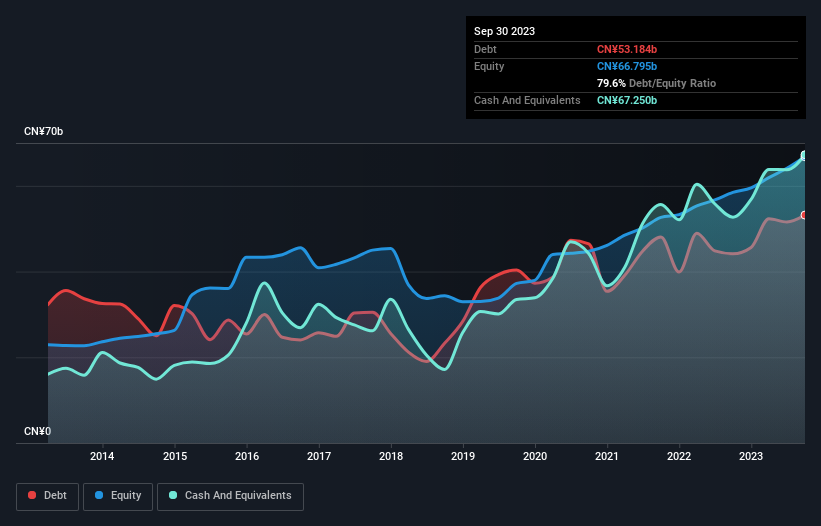- China
- /
- Communications
- /
- SZSE:000063
These 4 Measures Indicate That ZTE (SZSE:000063) Is Using Debt Reasonably Well

David Iben put it well when he said, 'Volatility is not a risk we care about. What we care about is avoiding the permanent loss of capital.' So it might be obvious that you need to consider debt, when you think about how risky any given stock is, because too much debt can sink a company. We can see that ZTE Corporation (SZSE:000063) does use debt in its business. But should shareholders be worried about its use of debt?
What Risk Does Debt Bring?
Debt and other liabilities become risky for a business when it cannot easily fulfill those obligations, either with free cash flow or by raising capital at an attractive price. Ultimately, if the company can't fulfill its legal obligations to repay debt, shareholders could walk away with nothing. While that is not too common, we often do see indebted companies permanently diluting shareholders because lenders force them to raise capital at a distressed price. By replacing dilution, though, debt can be an extremely good tool for businesses that need capital to invest in growth at high rates of return. The first step when considering a company's debt levels is to consider its cash and debt together.
Check out our latest analysis for ZTE
What Is ZTE's Debt?
The image below, which you can click on for greater detail, shows that at September 2023 ZTE had debt of CN¥53.2b, up from CN¥44.2b in one year. However, it does have CN¥67.2b in cash offsetting this, leading to net cash of CN¥14.1b.

How Healthy Is ZTE's Balance Sheet?
According to the last reported balance sheet, ZTE had liabilities of CN¥74.0b due within 12 months, and liabilities of CN¥48.2b due beyond 12 months. Offsetting this, it had CN¥67.2b in cash and CN¥25.0b in receivables that were due within 12 months. So it has liabilities totalling CN¥30.0b more than its cash and near-term receivables, combined.
While this might seem like a lot, it is not so bad since ZTE has a huge market capitalization of CN¥114.1b, and so it could probably strengthen its balance sheet by raising capital if it needed to. But it's clear that we should definitely closely examine whether it can manage its debt without dilution. Despite its noteworthy liabilities, ZTE boasts net cash, so it's fair to say it does not have a heavy debt load!
The good news is that ZTE has increased its EBIT by 8.8% over twelve months, which should ease any concerns about debt repayment. When analysing debt levels, the balance sheet is the obvious place to start. But ultimately the future profitability of the business will decide if ZTE can strengthen its balance sheet over time. So if you're focused on the future you can check out this free report showing analyst profit forecasts.
Finally, a company can only pay off debt with cold hard cash, not accounting profits. While ZTE has net cash on its balance sheet, it's still worth taking a look at its ability to convert earnings before interest and tax (EBIT) to free cash flow, to help us understand how quickly it is building (or eroding) that cash balance. During the last three years, ZTE generated free cash flow amounting to a very robust 93% of its EBIT, more than we'd expect. That positions it well to pay down debt if desirable to do so.
Summing Up
While ZTE does have more liabilities than liquid assets, it also has net cash of CN¥14.1b. The cherry on top was that in converted 93% of that EBIT to free cash flow, bringing in CN¥8.9b. So we don't think ZTE's use of debt is risky. There's no doubt that we learn most about debt from the balance sheet. However, not all investment risk resides within the balance sheet - far from it. For instance, we've identified 1 warning sign for ZTE that you should be aware of.
When all is said and done, sometimes its easier to focus on companies that don't even need debt. Readers can access a list of growth stocks with zero net debt 100% free, right now.
Valuation is complex, but we're here to simplify it.
Discover if ZTE might be undervalued or overvalued with our detailed analysis, featuring fair value estimates, potential risks, dividends, insider trades, and its financial condition.
Access Free AnalysisHave feedback on this article? Concerned about the content? Get in touch with us directly. Alternatively, email editorial-team (at) simplywallst.com.
This article by Simply Wall St is general in nature. We provide commentary based on historical data and analyst forecasts only using an unbiased methodology and our articles are not intended to be financial advice. It does not constitute a recommendation to buy or sell any stock, and does not take account of your objectives, or your financial situation. We aim to bring you long-term focused analysis driven by fundamental data. Note that our analysis may not factor in the latest price-sensitive company announcements or qualitative material. Simply Wall St has no position in any stocks mentioned.
About SZSE:000063
ZTE
Provides integrated communication information solutions in the People’s Republic of China, rest of Asia, Africa, Europe, the United States, and Oceania.
Flawless balance sheet average dividend payer.

